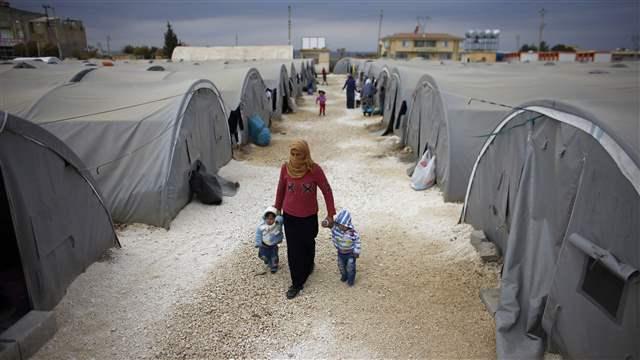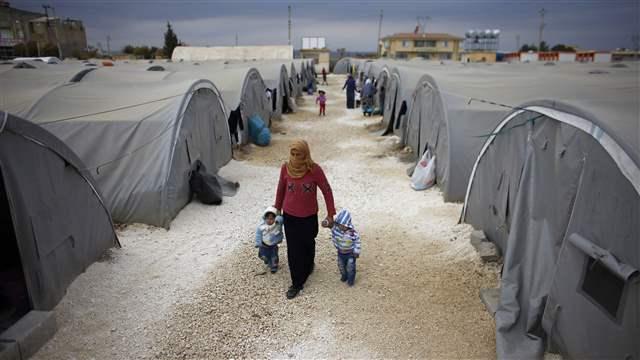Burak Kocamis is a One Young World Ambassador from Turkey who is currently a Senior at Boğaziçi University, Department of Chemical Engineering.
[[[image 0-large]]]
Europe is facing the worst humanitarian catastrophe of our time. Turkey is hosting over 3.5 million refugees mostly from Syria, Iraq and Afghanistan. It is the first secure destination for people fleeing war. In the last three years, tax payers spent more than $6 billion on refugees. Fortunately, there is not a major public reaction against these innocent people. But it is not realistic to expect Turkey to overcome this crisis alone. Erdogan’s Turkey is continuously on the edge of chaos.
Since 2011, 6.6 million Syrians have been internally displaced due to Civil War. More than 5 million Syrians fled to neighboring countries such as Turkey, Lebanon and Jordan. 2.7 million of them are currently in Turkey as Syria’s largest neighbor opened its 511-mile border to people seeking refuge from violence at home. Only 300,000 refugees are living in 25 official refugee camps in 10 cities. They have food, shelter, access to basic health and education services at government camps. However, in cities, they are alone. 2.4 million Syrian refugees are living in Turkey’s cities alongside more than a million refugees from Iraq, Afghanistan and Africa. This makes Turkey the single biggest refugee country in the world ahead of Pakistan and Lebanon. In some border cities, like Kilis, refugee population exceeds local population by up to 50%. Turkey’s population increased almost 2.5% due to mass migration, while annual growth of its local population is around 1.3%. Meanwhile, Erdogan is campaigning against any kind of birth control, and is calling for more and more unrestrained reproduction.
Syrian refugees here are still called and classified as ‘guests’ rather than ‘refugees’. This is legitimized by Turkey’s geographic limitation on the UN Refugee Convention. Refugees lacked certain rights, like having the right to work and attend school, until a recent law proposal permitted ‘Syrian guests’ to have jobs, albeit only in cities in which they are registered. Despite this, Syrian refugees have already created an off-record labor market in Turkish industry which pushes salaries down, especially in Southeastern border cities like Gaziantep, Kilis and Urfa. Illegal employment creates an unsecure work environment for refugees, and interrupts the market since they are mostly paid far less than normal wages.
Surprisingly, illegal labor is probably amongst the least feared impacts of Turkey’s refugee crisis. Turkey is the largest emerging market economy of the Middle-East, and the fastest growing market of Europe. Despite this, it struggles to provide jobs to its own youth. The illegal refugee labor market is somehow tolerated with regard to economic impacts. I fear a lot more as this a long-term problem. HALF of Syrian refugees are CHILDREN. More than 1 million children left their homes without being aware of anything. They were lucky whilst thousands died at home. Over 100,000 babies have been born in Turkey. They have never had a home in their life. 700,000 of these children are supposed to go to school, but more than 400,000 do not have access to any kind of education. There are few private enterprises stationed outside the camps, approved by the Ministry of Family and Social Policy, but the quality of the education and its continuity are highly doubted.
When I had inquired about this long-term problem at the Council of Europe in Strasbourg, I addressed the directors of refugee rights organizations, and they had absolutely no answer. They had not even considered it as a current problem. More fundamental things like food, shelter, and security are prioritized. We do not have such luxury. In Istanbul, there are now streets where only Arabic is written and spoken. It is perfectly fine, but reality is knocking at the door.
Are they going to go back to their homes? Turkey’s government thought so at the beginning of this war. They confidently thought that the war would soon be over, and that Assad would be replaced by a Turkish-backed Sunni opposition leader. Since ‘Syrian guests’ were only temporarily here, there was no need for a comprehensive integration plan besides providing basic protections. Well, it obviously did not turn out that way. It has been 5 years, and so the problem goes on. There is not a Syria anymore. The masses are not supposed to go back home in near future. 1 million Syrian children are going to be adults in a foreign country soon. They do not have a proper education, any labor skills, or oftentimes, even basic identification. Let alone going back and transforming their devastated country into a modern, democratic one, they are even not close to integrating into Turkey’s society yet. They do not speak proper Turkish, or receive any kind of Turkish education. Syrian ‘guests’ are now facing the risk of becoming a permanent minority that is excluded and marginalized. This is all because Turkish authorities cannot realistically provide necessary settlement conditions for over 3 million people. Turkey’s newborn minority is a time-bomb both for itself and rest of the country.
In other words, Turkey is failing to provide necessary settlement conditions for all 3 million refugees. Most asylum-seekers will be waiting for years to get even an interview to be accepted. Authorities are forcing refugees to live in camps rather than cities. That is why hundreds of thousands people are flowing from Turkey’s coasts towards Western European countries where they believe a brighter future exists. But terror attacks and right-wing pressure push EU governments to take illegal and sometimes cruel precautions against the masses. While thousands suffer at the Macedonian and Hungarian borders, or risk their lives crossing the Aegean Sea, the EU is unfortunately bargaining on ‘numbers’ and ‘qualifications’ by manipulating Turkey’s prolonged EU full-membership process. In exchange for Turkey’s refugee flow blockage, the EU offers a few billion euros of funding and visa liberalization for Turkish citizens, which was promised long time ago. The EU is also criticized for ignoring Turkey’s democratic issues, such as the ‘The Presidential Palace’ which increasingly consolidates state power around itself.
Amnesty International recently published a report against the controversial EU-Turkey refugee deal. The report indicates that the idea of Turkey being a safe country for asylum-seekers and refugees is “fiction”. Findings suggest that Turkey’s current asylum system is not able to deal with over 3 million refugees. Thus, return of refugees to Turkey is unlawful. The EU has to share the responsibility rather than trade human beings. Two parties have to lawfully agree and co-operate in order to secure people’s lives and meet their basic requirements.
Well, how did Turkey end up here? The AK Party’s (ruling Turkey since 2002) Syrian policy is a disaster. Reality has not met any of their predictions, literally. They did not see that this was a proxy war, and assumed they were the game-makers in this situation. Instead, the Assad regime did not collapse, ISIS was not ‘just [a group of] angry young men’ as former PM Davutoglu once said, Kurdish YPG-controlled cities did not fall as Erdogan guessed, the Free Syrian Army did not prevail, and so on. Turkey’s controversial interference against Assad’s allies, Iran and Russia, escalated the conflict and made everything worse. Therefore, this major refugee flow has become permanent and gone beyond what Turkey was prepared for. Also, the government’s open-gate policy has made itself too vulnerable against terror threats coming beyond the borders. On that note, I must say that even the hardest oppositioners are not criticizing the government’s open-gate policy, but appreciate it as an example of Anatolian hospitality. The opposition in Turkey instead argues that Turkey’s security breach, refugee crisis, ruined relations with neighbors and allies, and the whole Syrian Civil War are serious consequences of the AK Party’s actions, primarily President and former PM Erdogan’s, because of its foreign policies based on fantasies.
Turkey has always been a problematic country, but it has never been so close to the edge of chaos as Erdogan’s Turkey is today. The last 5 years not only caused the Syrian conflict to become a disaster threatening global security, but also turned Turkey into a lonely, divided, unstable and violent country, primarily beginning with the 2013 Gezi Park Protests. Meanwhile, the peace process with PKK (Kurdish armed group fighting against Turkish state for 35 years) has collapsed, and conflict has been ascending for a year. Over 300,000 citizens are internally displaced due to violence in Southeastern Turkey. Terror attacks in the capital, Ankara, killed 178 in a year. Recently, in just the past two months, ISIS hit the border city of Kilis more than 60 times, and killed 20 people including Syrian refugee children. More than 350 soldiers have been killed in clashes with PKK, and there have been many more civilian casualties during this past year of conflict. It is really not possible for me to count every single occurrence that pushes Turkey to the edge.
Indeed, Erdogan’s Turkey is troubled, and it seems like it won’t see the sunshine soon. While I was working on this post, President Erdogan replaced PM Davutoglu, who made the refugee deal with EU, with someone else from AK Party. As a likely counter-move against that, the German Parliament recognized the 1915 events as the ‘Armenian Genocide’. Visa liberalization and the refugee deal are in a deadlock now. Erdogan’s Turkey is in an endless political drama; these political equations are affecting refugees’ future- the future of innocent children.
Civil society needs to raise its voice all over Europe. We shall not let violence and hatred close our eyes, our hearts and our minds.

